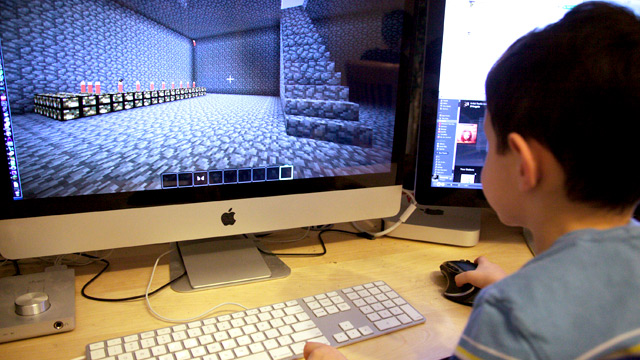Ah, summer: a time for swimming, camps, and kids to play outside. Well if you live in the South like I do, you might find getting your child to venture out of the A/C into the summer heat a Herculean endeavor. Instead, you may find your child simply wanting to stay inside and play games, no matter where you live.
While it may seem strange or worrisome that your child wants to stay inside and play Minecraft all day, fret not! There is actually less worry about than you may think.

As a parent myself, I know the number one worry of most of us parents is if we are doing the right thing. We want the best for our children, but we may sometimes have doubts if what we are doing is the best for our children. So today let’s look at why a kid is staying inside to play video games is not necessarily a bad thing.
As with all things, moderation is key.
While video games are great and can be used as learning experiences and have other tangential benefits (which we will get to shortly), there is so much as too much of a good thing. With a recent piece here on GameSkinny, Kate Reynolds reported on a study that found the optimal play time for children to be no more than one hour a day. Kids who played less than one hour a day felt more satisfied in life and were also more social as compared to kids who don’t play video games.

Now, if your child plays more than one hour a day, don’t worry.
The study suggested children could still receive some benefits from longer play times, but noticed a plateau of benefits after the child had played more than three hours. So long as your child is playing between one to three hours a day or at least not playing all day every day, your child may receive some of the benefits found in the study.
Additionally, we have all heard the claims that kids playing violent video games, or video games in general, can increase aggression or cause violence. However, we have even more proof that games do not cause violence. There have been multiple studies conducted on this topic and none have proved a definitive, causative link between video games and aggressive behavior.
There are benefits to playing games.
Numerous studies have been conducted to discern if video games have any positive benefits on a person’s health and surprise! They actually do. This article at the Huffington Post goes into specifics if you are curious. Generally though, video games can help improve hand-eye coordination, increase the brain’s flexibility, slow the aging process, and improve your eyesight, among many other benefits.
While these results may vary depending on your child and other factors, it stands to reason your child could receive some benefits from their playtime.

Games can also be used as learning tools as well. There are countless of educational games that teach information in a way that is fun to a child without insulting their intelligence. In fact, I have been using games to help teach my daughter colors, animals, and other such things. Games can be a wonderful teaching tool on top of all of the other benefits they may bestow.
While these benefits are great, I have met many parents who are worried about their child playing games alone. However, with the rise of online gaming and popular titles such as Minecraft and League of Legends, players are actually spending less time playing alone and statistically much more time playing with others.
They aren’t playing alone.

Various studies have shown players are spending less time playing alone and playing more with others, whether in person or over the Internet. As your child plays video games, they may also be increasing their social skills, and if their gaming partner lives in another state or country, they may even learn about different cultures and lifestyles as well.
Even if your child is not directly playing with others, games make for great conversation pieces and can give your child a ton to talk about with friends; it’s surprisingly social. Several times I have played a game and recounted the tales of my amazing experiences to my friends later, who then countered with their own tales of their own personal experience.
Games make for great water cooler topics and also give children a common ground for discussion topics.
What is the appeal of games anyway?
As someone who has grown up playing games and now makes some of their living by writing about them, I assure you there is nothing quite like playing video games. There is no other form of media that even comes close to what video games can do. Games allow us to immerse ourselves in imaginative worlds filled with fantastic books. They allow us to experience situations and life experiences we otherwise would not be able to.

They can even be used to address and discuss difficult topics we face as humans who must understand and interact with others. Video games are akin to the great worlds we read about in books come to life in a way we can actually interact with in ways besides our imagination. Since most children have more active imaginations than adults, they are more likely to be absorbed in the fantastic worlds gaming allows us to explore.
What can you do as a parent?
So far we have covered why kids play games, the benefits to playing games, and a generalized time limit. By far, the most important things you can do as a parent is to respect their hobby. You don’t have to understand everything about games, but a basic knowledge foundation can go a long way to understanding this relatively new form of entertainment.

Watch your children playing the game and see the way they interact with this virtual world. Ask questions, no matter how silly they may seem. By showing interest, even slightly, you have created a new thing to bond with your child over. If you are one of those awesome, daring parents, you could even try your hand at playing some of these games! Just don’t take it personally if your child manages to best you. Games can be an excellent way to spend time together, bond, and have some stories to tell later! What’s not to love?
How can I keep them from gaming all day?
As I mentioned earlier, there seems to be a sweet spot for play time that ensures the child receives the most benefits from playing. No matter the limits you set though, your kids may want to continue playing past the limits you set. So what can you do to help encourage kids to keep to the limits without complaining or be willing to engage in some other activities?
Getting your child interested in other activities is by far the easiest solution as they can jump from games to another activity. If you can get your child interested in books, you will be home free. Nowadays games aren’t limited to strictly video games. There are comics and books based on several major properties, not including the countless action figures and toys based on game properties. A book based on your child’s favorite games can help develop a love for reading while still allowing them to interact in their imagination with familiar characters.

A delightful series I wholeheartedly recommend.
There are also physical activities that parallel what children can do in games. Rock climbing, swimming, and laser tag (among countless other activities) are things kids can do outside, but are also similar activities to what they may do in their favorite video games. Besides activities which are similar to what one sees in games, there also apps which gamify physical activity.
One of the most notable ones is Zombies Run! (Apple users click here and Android users click here). The app tells the tale of a zombie outbreak and you, as the player’s attempts to survive in this harsh world. What makes the app interesting is you have to physically run in order to do actions in the game.

Collecting supplies? Gotta run! Want to travel? Better get those running shoes on! This allows people who may not normally run (myself included!) an incentive to do so. Running can be fun! Now the game is about zombies and has some language, so you may want to test the game before allowing younger ones to play. There are several apps and games out there that seek to make physical activities or mundane activities fresh and exciting!
In summary:
- There are benefits to kids playing games.
- Less than one hour seems to be the ideal play time length.
- One to three hours allows kids to retain some of the benefits of playing.
- Games are a social activity for children and adults alike.
- Games can be used as teaching tools.
- Games encourage children to use their imaginations.
- Asking questions about the games your child plays or playing with them is a great way to bond.
- Try to adhere to some time limit.
- Encourage other activities such as reading, drawing, or outdoor activities.
- Some outdoor activities are close parallels to what they experience in games.
- There are apps and games that can be used to make physical activities or mundane things exciting.
Hopefully this has curbed some worries you may have about your child playing games, and you maybe learned a thing or two about video games. At the end of the day, anything you read here is a general rule of thumb. Every child is different. What works for my child may not work for your child. As with any parenting advice, temper it with your knowledge of your child and use a little common sense.

Stay tuned to GameSkinny for more parenting articles!







Published: Jul 16, 2015 11:41 am